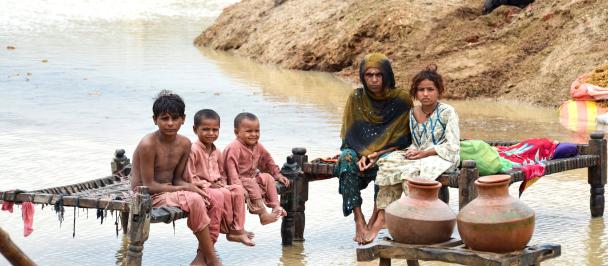Hanna Lake in Urak Valley, surrounded by mountains, which was once famous for its beautiful scenery, is now a sight of a barren land. Photo © UNDP Pakistan/Muhammad Marri
The year 2025 has been marked as the year when Pakistan might turn from a “water-stressed” country to a “water-scarce” country. With a five-fold increase in Pakistan’s population since 1960, and with the current 30-day water storage capacity, some 207 million people will face ‘absolute scarcity’ of water, with less than 500 cubic meters available per person by 2025.
Balochistan is one of Pakistan’s water-starved provinces. Over the past decade or so, recurring droughts have caused intractable challenges with regards to water availability in Balochistan. Quetta, the only metropolitan city in Balochistan, has a severe water shortage problem and faces immense challenges in terms of water availability. Water supply in the city has decreased significantly due to reduction in supply from water reservoirs and ground water depletion. Extensive and unregulated usage of ground water for household and commercial purposes is another problem.

© UNDP Pakistan/Muhammad Marri
In addition to the dwindling supply, water scarcity is also attributed to over-consumption. It is evident that people waste water due to its low monetary value and limited regulations that prevent wasteful use of water. Based on the findings of a recent survey, a service station uses about 19,000 liters of water per day. A standard car uses about 80 liters of water per wash, which directly leads to water wastage. Having said that, a water recycling plant at a service station can help conserve up to 60-70% of water for re-use. UNDP has developed an indigenous and cost-effective water recycling prototype which recycles up to 5000 liters of water per day per station. Our wastewater recycling plant is an automated single structure. Using simple techniques that involve sedimentation in underground tanks and using chemical and biological treatments, the plant recycles water on-site.
© UNDP Pakistan/Muhammad Marri
UNDP jointly with private sector partners has designed and installed two of these water recycling plants in Quetta. The newly installed water recycling plants, a maiden initiative in the province, is an extension of UNDPs ongoing efforts to promote conservation and re-use of water in different sectors of the economy.
According to Mr. Eijaz, Manager of Byco service station in Quetta, the recycling plant has proven to be effective and successful in creating a new and reliable water supply. He further added, “In the past, we used to purchase water tankers every alternate day, but not anymore.” He was pleased that this water was now also being utilized for watering plants.
© UNDP Pakistan/Muhammad Marri
Customers at the service station also feel good that they are contributing in water recycling and not wasting water. According to Ms. Saima, a local from Quetta, "This initiative is of immense significance as we will never know the importance of water till it dries up completely; a horrific situation already confronted by local communities."
To prevent a terrible scarcity of water from becoming a reality, concerted efforts and novel methods must be devised. This prototype may be the first step in that direction. These efforts need to be complemented by policy actions by municipal authorities to make water recycling mandatory and by extending support to service stations to mobilize resources to install recycling plants through developing financial products. Let us hope that there would be other initiatives of a similar nature to secure the future of the country.
Edited by:
Ayesha Babar
Communications Analyst and Head of Communication Unit, UNDP Pakistan
Authors:
Zulfiqar Durrani
Provincial Representative, UNDP Pakistan Sub Office Quetta
Muhammad Marri
Communications Officer, Mainstreaming, Acceleration and Policy Support (MAPS) for SDGs in Balochistan, UNDP Pakistan

 Locations
Locations






